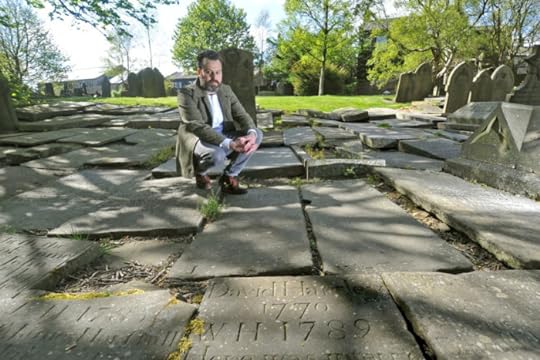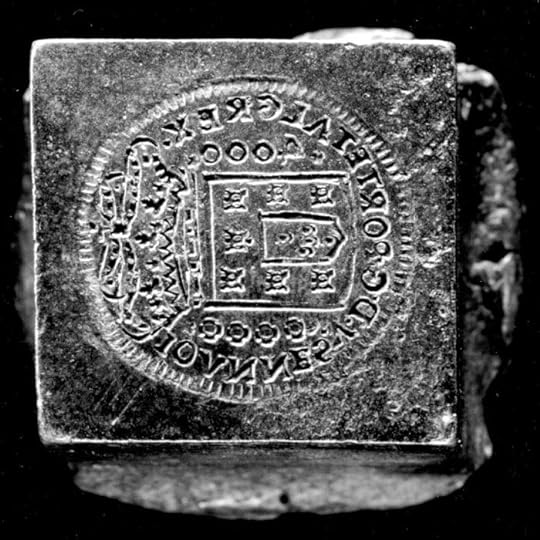What do you think?
Rate this book


371 pages, Paperback
First published May 17, 2017
This is why I rite these werds down for you new becors historee is only ever remembured by the powerfull and the welthy the book lerners in the big howses with thur fancy kwills … to these .. I say this is my story not my confeshun My story as I sor it These are not the werds of a man turned sower with regret and if I had another chance Id do it all the sayme again but bigger and better
Winter has just released its frosted grip on the valley and the sky was heavy with clouds that dragged themselves across it like broken animals behind him
Over the top of the trees smoke settled itself like tangled dirty white shearings of a summer flock not yet dipped and combed and dried
Autumn arrived like a burning ghost ship on the landscape’s tide to set the land alight. The fire of the trees’ turning spread far across the flanks and the ravens took flight to the highest climes as leaves fell like flung bodies. September had long slipped away. It was a charred thing now. Gone
Finally the sky was free of clouds and the stars cut through the night like smashed quartz sprinkled and thrown aloft to stick there.
The earthy sky was swollen grey. Soon it became too heavy to hold itself and it sagged through the night, finally falling apart in fragments of sleet
At first light fresh snowdrops quivered like rung bells … their delicate oversized white crowns hung heavy on thing green stems like the heads of newborn babies
Sycamore and silver birch, he said. Beech and goat willow. Oak and Ash. Because this is our kingdom of Jorvikshire and time was the whole island was like this once. It was coast to coast with trees, all the way up to these higher lands of ours. The wildwood they called it. We lived as clans then. Under the trees when the trees were worshipped as Gods. Under the great rustling canopy. Tribal, like. Maybe a few of us still do. It was the way of the land then. You protected you and yours. You still do. Protection was our purpose. Protection from any incomers. That and the providing of food and fire, and seeding your women. You banded together close then and you hunted and you defended and you fought for your corner of England.
Because viewed from afar night after night the solitary orange flame that burned tiny on the horizon had become for William Deighton a symbol for society’s undoing. It represented lawlessness. England’s downfall. The home of Hartley was a fertile bed for criminality and barbarism. Theft and forgery. Violence and mendacity. It was against progress. It was anti-empire, anti-monarchy, anti-government. No county or country could ever hope to flourish as long as people like Bell House’s inhabitants and their many pin-eyed, low-browed, dirty-fingered acolytes continue to ply their illicit trade without redress.
This lawmen thinks there is only one king worth recognising. But what does this man do for us and our families? What has he done for this valley, but help carve it up and sell it off? What have any of them done? Because it is lawmen and money men like this Robert Parker and flunkies like William Deighton who serve the wealthy bastards who for years have now staked a claim on these moorlands, these woods, these waterfalls. The same rich pheasant-fattened bastards who’ll have us out on our ears when the cotton men come. And they are coming – mark my words. The machines and the mills are coming, but it’ll not be enough for them to have us living in hedgerows and ditches like the cursed Diddakoi of the road. No. They won’t even let us make a penny to put a scran in our cupboards. They care nothing for the people of the valley like we do. [Everyone] that has given up their coin has made it twofold. We share our gains with the people because they are our people. We do not take our money and build castles to keep them out. We welcome them in
The sky-line is thick with factory smoke now …. The land is being sold off. They’re putting up great chimneys of stone that are twice as tall as any tree and there are machines that do the work of a hundred men, and it takes mountains of coal to feed them. They’re sinking mines to get thje dusky diamonds from the ground to fuel the mills. Children are in their employment now ….. There are men who are said to be making fortunes far greater than anything we can imagine …. The weaving is finished and the farming is finished and the clipping is finished
So name your Gods lads. Honour them. Live amongst them. And always remember your place. Because England is changing. The wheels of industry turn ever onwards and the trees are falling still. Last week I did chance to meet a man down there in Cragg Vale who told me that soon this valley is to be invaded. He spoke of chimneys and waterways and told of work for those that wanted it, but work that pays a pittance and keeps you enslaved to those that make the money. This man - he told me that this land around us was soon no longer to be our land but that of those who want to reap and rape and bind those of us whose blood is in the sod.The independent publisher Bluemoose Books aims to deliver brilliant stories that have travelled from Hebden Bridge, across the border into Lancashire, down to London across to Moscow, Sofia and Budapest and into the United States, Australia, India, Colombia and Greenland, Iceland and Bosnia Herzevogina.



Send a message. A message to the hill folk. That times were changing. The empire expanding. That men earned money not made it; that a country ran on rules. Rules for everyone. Call it society. Call it civilisation. From the crown all the way down. Rules. Laws. Restrictions. The dark days were over. New ways were coming. Big ideas. Ideas that would change the world. Call it economy. Call it industry. Call it England.And on a 2nd read in December 2017, I could also see echoes of the current fad of cryptocurrencies, threatening to debase fiat money, and cryptoanarchy:
The rain fell like the filings of a milled guinea bit onto a folded piece of paper.And describing the “supergrasses” (pace Chumbawumba) who eventually brought down the Coiners:
All his life Joseph ‘Belch’ Broadbent had been shrouded in smoke. Years tending the charcoal clamp meant it flavoured not just his clothes and hair with the slow dampened burn of oak and willow and alder, nor merely tanned his skin with soot and blackened dirt, but was within him; it had smoked him from the inside out and left Belch Broadbent with rheumy lidded eyes and a hacking cough that rattled most violently in the early hours.The Guardian has already made the comparison that The Gallows Pole might be 2017’s His Bloody Project, but in my view it is much much better than that. A notable point of comparison is that both feature excerpts of a condemned-cell confession but whereas HBP’s version was unrealistically literate (https://www.goodreads.com/review/show...), King David Hartley’s thoughts are written in a sort of pidgin English that reads oddly but works if read aloud (rather reminiscent of Paul Kingsnorth’s The Wake, another Gordon Burn Prize winner), and give insight into his motivations, both his self-importance but also his doubts, and his rather delusional visions of the stag-men
James Broadbent walked towards the distant rising plume that marked his father’s position as if it were a swarm of wasps leaving its fissure of an arid woodland floor or curl of a crawling tree root.
[…]
The earth was in his father’s scalp and his stubble. It had become him. His body hosted smoke. It was stirred into his essence to dilute that which made him human so that he was now part of the landscape and part of the fire; he was made of the smoke that billowed and rolled and tumbled during the slow process that took felled timber through combustion to become the shards and clots of carbon that fuelled fires and furnaces the length and breadth of Calderdale. He was wood-smoke manifest; man as a settled miasma. A nebulous fellow, burnt brume in stout boots, with a clay pipe clicking between what remained of his teeth.
I saw them. Stag-headed men dancing at on the moor at midnight, nostrils flared and steam rising.Both the narrative tension and the perspective of the novel are at the micro-level in the enclosed world of the moors and particularly in the thoughts and actions of Hartley. We hear allusions to the impact of the debasement of the coin of the realm on the wider economy, but this largely happens off-page. And both the title of the novel and the fatalistic attitude of the Hartleys leave us in little doubt where the story will end: even the identity of their ultimate betrayer is pretty clear from the opening pages (hence lack of any spoiler alerts in my review).
It took the stubborn scavengers and the stealthy to live up here. The cunning and the vicious. The solitary and the half-mad.
He ran across the field, stumbling in holes. Holes that dotted the field. The field that would lay fallow and frozen over the coming months. The months of a winter already coming in on the autumn breeze. A breeze that rustled the stubby clusters of grass. Grass that fed the cows that made the milk. The milk that weaned the children of the valley. The valley that they said ran rich with gold.